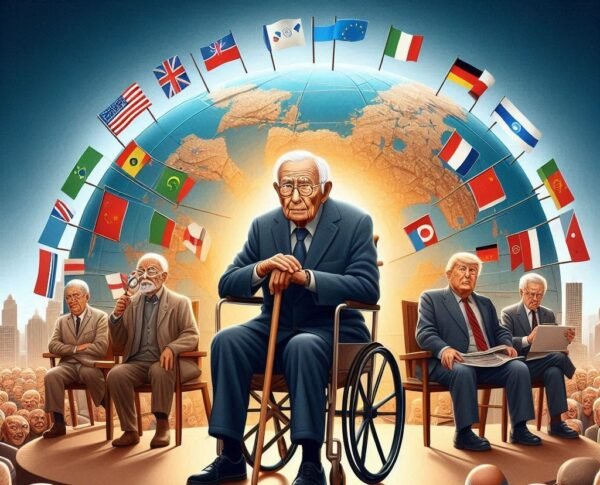Almost at Retirement: Age of Above 70 World Leaders, Are Responsible for World Conflict?

The trend of aging world leaders has significant implications for global politics and conflict. As of 2024, many influential leaders are in their 70s and 80s, raising questions about their ability to effectively address contemporary challenges.
This trend towards older leadership is particularly pronounced in autocratic regimes, where leaders often hold on to power longer than in democracies. The average age of dictators has risen to 64, reflecting a global shift towards gerontocracy—a governance system led by older individuals.
Research indicates that older leaders may engage their states in interstate disputes more frequently than younger leaders. This phenomenon raises concerns about the disconnect between aging leaders and the aspirations of younger populations, who may feel underrepresented by leaders who are less attuned to modern issues and innovations.
While some argue that older leaders bring wisdom and stability, critics suggest they may lack the agility needed to navigate rapidly changing global dynamics. The increasing prevalence of gerontocracy could hinder effective governance and conflict resolution, especially as younger generations demand different approaches to leadership and policy-making.
The rising age of world leaders poses challenges for international relations and conflict management. As the global political landscape continues to evolve, the effectiveness of these aging leaders in addressing contemporary issues remains a critical topic for discussion.
While it’s true that some world leaders are over 70, it’s inaccurate to suggest that age is the primary driver of global conflict. Here’s why:
Complex Causes: Conflicts arise from a multitude of factors, including political ideologies, economic disparities, historical grievances, and resource competition. Attributing them solely to the age of leaders oversimplifies a complex issue.
Experience and Wisdom: Many older leaders bring decades of experience and nuanced understanding to their roles. This can be valuable in navigating complex international relations and preventing conflicts.
Younger Leaders, Similar Issues: History has shown that younger leaders are not immune to making decisions that lead to conflict. The causes of war are often rooted in systemic issues, not solely the age of those in power.
Focus on Policies: It’s more productive to analyze the specific policies and actions of leaders, regardless of age, rather than making generalizations based on demographics.
It’s important to consider the individual leader, their specific context, and the multitude of factors that contribute to conflict, rather than focusing solely on age.
The question of whether world leaders over the age of 70 are responsible for global conflicts is complex and doesn’t have a simple yes or no answer. Several factors influence world conflicts, and the age of a leader is just one aspect. Let’s break this down:
1. Age and Experience
Older leaders often bring extensive experience to their positions. They have lived through multiple political shifts, crises, and international relations developments. This experience can be a double-edged sword. On the one hand, it could give them a more nuanced understanding of global issues, but on the other hand, it may make them more set in their ways or less adaptable to changing dynamics.
2. Physical and Mental Health
Age can impact physical and mental health. Some leaders, especially those well into their 80s or beyond, may struggle with the cognitive demands of leading a nation. However, not all older leaders are affected by this in the same way—some remain sharp, while others show signs of decline.
3. Stubbornness and Risk-Taking
Older leaders may have more to prove or may feel their legacy is at stake. This can lead to riskier decision-making, especially when it comes to military or diplomatic matters. In some cases, leaders who are in the later stages of life might not be as cautious about potential consequences as younger, more future-oriented leaders.
4. Long-Standing Power Structures
Many leaders who are over 70 have been in power for extended periods and may have entrenched power structures or personal interests that resist change. This can contribute to internal and external tensions, especially in nations that are dealing with issues like corruption, economic instability, or human rights violations. These long-serving leaders may be less open to compromise or international collaboration, escalating global tensions.
5. Global Conflicts and Their Causes
World conflicts are rarely the responsibility of one leader alone. Issues like territorial disputes, economic interests, historical grievances, and ideological differences often fuel conflicts. The actions of any given leader may exacerbate or mitigate these issues, but they don’t necessarily cause them in isolation. For example, conflicts in the Middle East or the war in Ukraine are deeply rooted in history, regional politics, and ideological differences, and can’t be blamed solely on the age of a particular leader.
6. Generational Change and Conflict Resolution
One of the challenges is the potential for generational divides. Younger leaders might have different approaches to diplomacy, conflict resolution, and international cooperation. As the older generation retires or transitions out of power, there may be hope for a shift in how world conflicts are addressed.
Age alone doesn’t determine whether a leader is responsible for world conflicts. It’s the combination of a leader’s experience, decision-making, political context, and the complex global environment that shapes their impact. While older leaders may carry some risks due to entrenched beliefs or health issues, it’s important not to oversimplify the cause of global conflict by attributing it solely to the age of political leaders.
What do you think about the relationship between age and leadership in world politics? Does it concern you when leaders are well into their 70s or 80s?
